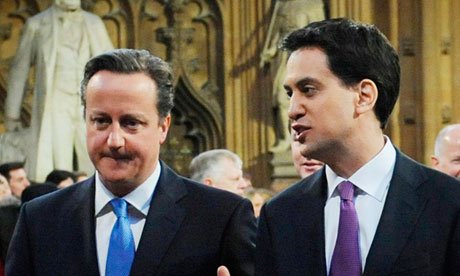
David Cameron and Ed Miliband: Labour's poll lead is the biggest since May 2003. Photograph: Stefan Rousseau/PA
Labour has forged a 12-point lead over the Conservatives for the first time in almost a decade, according to a Guardian/ICM poll.
Ed Miliband's party now stands at 41% of the vote, up three points onICM's January figure, and the Tories are on just 29%, having slipped back four from 33% last month. Meanwhile, the Liberal Democrats have sunk two points, to 13%, whereas Ukip has inched up three to 9% – setting a new record for Nigel Farage's anti-European outfit in the Guardian/ICM series.
The Labour lead is the biggest – and the Conservative vote-share the smallest – in the polling series since May 2003, during the brief political bounce for Tony Blair which came between the felling of Saddam Hussein's statue in Baghdad and first stirrings of civil war in Iraq and arguments about dodgy dossiers.
With his party plumbing the sort of depths associated with the second half of the John Major era, David Cameron will be particularly dismayed about the continuing surge in Ukip support, a challenge on the right flank which the prime minister's recent speech proposing a referendum on the EU was designed to head off. In the runup to this month's Eastleigh byelection – which local surveys suggest will be close between the Tories and the Lib Dems – Monday's poll suggests that Conservative hopes in the seat formerly held by Chris Huhne will have to rest more upon the weakness of their coalition partners than anything else. There have been two local polls so far; one gave the Tories a small lead, the other the Lib Dems.
After last month's coalition proposals to shake up childcare provision, the gender breakdown of the vote will further worry the prime minister. Whereas among men Labour enjoys a 7-point lead over the Tories (36%-29%), among women it is 26 points (51%-25%).
Labour's 12-point lead with ICM is marginally larger than leads of nine and 10 points recorded by two other polls reported by Sunday Times and the Observer over the weekend, and it is especially striking because ICM's methodology – which has delivered many impressive predictions in past elections – adjusts the figures to take account "shy Tory voters", the name given to the marked difference between the proportion who vote for the party in elections and proportion who say they will vote for the party when asked in opinion polls.
The detail of the new poll provides warnings that Labour's new lead remains far from solid. The sluggish economy will be the decisive battleground of the next election, and after Britain's new dive into a fresh economic contraction during the final quarter of 2012, the opposition might have expected to be winning the blame game. Instead, more voters continue to point the finger at the last Labour government than the current coalition.
Asked to name the chief culprit for the economic slowdown, 29% identify Labour's "debts ... racked up to finance unsustainable spending". This is exactly the same proportion as when the question was last asked last May.
While Labour has failed to make any progress in this respect since May, the coalition has slipped back. At that time only 17% of voters blamed government cuts compared with 23% now, whereas 24% identified "chill economic winds blowing in from the eurozone", a proportion that has now shrunk to 16%, as the crisis in the single currency has entered a less acute phase. The 21% of voters who blame bankers for "refusing to provide loans" that firms need for investment remains unchanged.
Among the assorted other parties, the Scottish National party is at 2% (down one on the month) while Plaid Cymru holds steady on 1%. The Greens also remain unchanged, at 2%, while the British National party picks up a point, to stand at 2%.
ICM Research interviewed a random sample of 1001 adults aged 18+ by telephone on 8-10th February 2013. Interviews were conducted across the country and the results have been weighted to the profile of all adults. ICM is a member of the British Polling Council and abides by its rules.
No comments:
Post a Comment